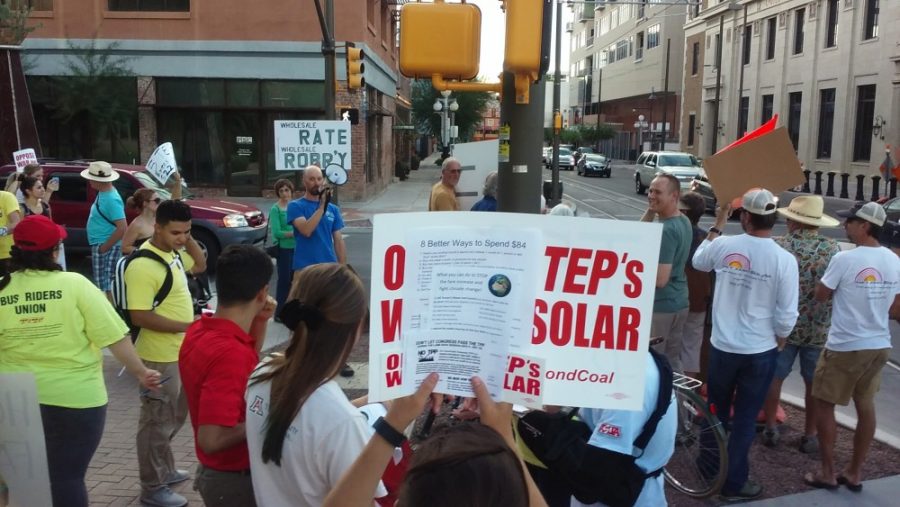A group of protesters gathered outside the headquarters of Tucson Electric Power and marched to Tucson High School’s auditorium on Wednesday, Aug 31. Included in these protesters were a handful of UA students from Students for Sustainability.
Their destination was the Arizona Cooperation Commission’s public hearing on TEP’s requested rate increases. TEP’s rate case proposes a 70 percent increase in monthly fixed charges and a 7 percent increase in rates per hour for their customers.
Russell Lowes, the energy subcommittee chair for the Sierra Club in Tucson and an organizer of the protests, said 44 speakers went before the commission to speak out against TEP’s rate increases.
One speaker was UA environmental studies senior Diego Martinez-Lugo who told the commissioners these proposed rate increases target and affect marginalized communities.
Martinez-Lugo serves as the chair for the UA Students for Sustainability Energy and Climate Committee.
He said low-income families are disproportionately affected by an increase in fixed charges because they reduce the incentive for consumers to conserve power.
As well as harming other residents with a fixed income, Martinez-Lugo said continuing to rely on coal and natural gas threatens our water, air and public resources.
RELATED: UA’s first sustainability-based rummage sale brings in $9,000
TEP also presented a proposal to reduce net metering or the rate of reimbursement they provide costumers with solar power.
Currently, if a customer with solar panels produces a 100kW of power and uses 100kW their bill will only include fixed charges. TEP wants to reduce this one to one retail price ratio to a wholesale price ratio when buying customer power.
If a customer produces enough power to supply their own needs, they would still need to buy power from TEP’s grid in this new plan.
TEP argues that they can obtain power from a centralized power plant at a lower cost.
UA geography graduate student Remington Franklin said this proposal makes solar a much less appealing investment. When SRP in Phoenix had a similar proposal approved, they saw a 95 percent reduction in applications for rooftop solar panels.
The Arizona Cooperation Commission will vote on whether to approve, modify or reject TEP’s proposed rate increases in the coming months. Their first vote, on Sept. 8, will focus solely on TEP’s proposed fixed charge increases.
Franklin said the commission must mediate between TEP’s shareholder’s interest and rate payer’s interest.
Five elected officials serve on the Arizona Cooperation Commission. This November, three commission seats are up for election. Two democrats and three republicans will appear on the ballot and the three candidates who receive the most votes will serve a four-year term.
The ACC represents the public interest in these matters.
Franklin said the challenge is to develop greater energy literacy and to encourage individuals in the community to get involved in the political process.
Follow Randall Eck on Twitter.








